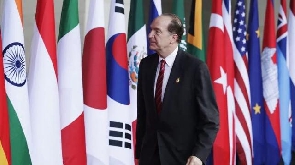Di global economy dey "perilously close to falling into recession", na so one latest forecast from di World Bank tok.
Dem dey expect say di global economy go grow just 1.7% dis year - one sharp decrease from di 3% wey dem predict for June.
Di report blame different number of factors wey come from Russia invasion of Ukraine and di impact of di pandemic.
Dem pick impacts of higher interest rates out as di key challenge for policy makers to overcome.
World Bank president David Malpass don tok say di downturn go dey "broad-based" and growth for wetin pipo dey earn for almost evri part of di world go "dey slow pass as e be during di decade before Covid-19".
Di 1.7% growth figure go be di lowest since 1991, wit di exceptions of di recessions of 2009 and 2020, wey di global financial crisis and di Covid pandemic cause.
Growth for di world richest economies dey likely to kontinu im sharp slowdown from 5.3% for post-pandemic 2021 to 2.5% for 2022 and just 0.5% dis year.
"Ova di past two decades, slowdowns of dis scale don foreshadow global recession," di bank warn, den add say dem bin don anticipate "a sharp, long-lasting slowdown".
If any global recession go happun, e go be di first time since di 1930s wey two global recessions go happun di same decade.
How to tackle rising prices
Higher inflation na one of di main reasons wey di global economy dey struggle wit. Global food and energy prices rise last year as di war for Ukraine lead to reduced crop supplies and push di West to move away from Russian fossil fuels.
Di World Bank say e dey expect di global pace of price rises to slow from 7.6% in 2022 to 5.2% dis year, as doz pressures ease.
While some "rise in prices dey possible". Di bank say e bin expect energy prices to fall in general.
E point to di increase in global production and lower demand for Europe, wia an energy crisis bin don lead businesses and households to reduce dia use of gas.
Prices of Crops fit fall by 5% dis year according to forecast even though dem go still dey significantly higher dan dem bin dey few years ago, sake of say dem don rise by 13% for 2022.
Despite dis developments, inflation dey expected to remain well above di 2% rate wey dem consider healthy.
Central banks for plenti kontris including di US and di UK, bin don dey raise interest rates to respond to di problem, as dem dey aim to cool dia economies and reduce di pressures wey dey push prices up.
But dem dey pass through one delicate path as dem dey try to address di cost-of-living crisis while dem no dey also tip dia economies to enta into recession.
Di World Bank say higher borrowing costs don choke business investments and dem warn say more companies dey struggle wit di debts dem dey owe.
Dem dey also squeeze Developing economies hard by US interest rates, wey dey expected to rise further. Many of dem borrow money in US dollars.
Di Bank tok say even wit di global economy wey dey "under pressure" di right goment policies fit give hope.
E recommend measures to boost investments and create jobs, tackle climate change, address di debts of poorer kontris and facilitate international trade.
BBC Pidgin of Wednesday, 11 January 2023
Source: BBC
















